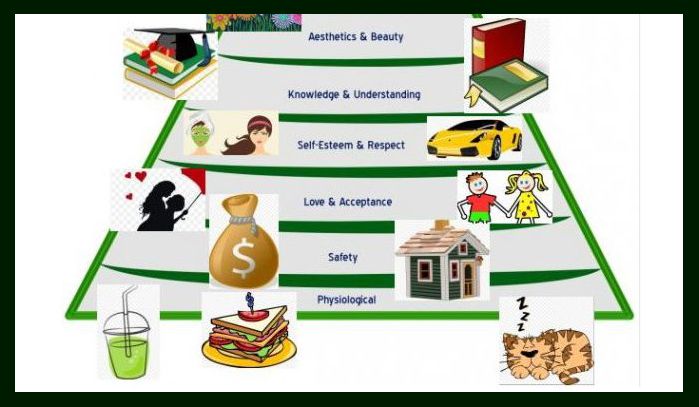In 1943, a psychologist by the name of Abraham Maslow wrote a paper for the Psychological Review entitled, “A Theory of Human Motivation.” In this paper, Maslow proposed a five-part theory where he describes what motivates human beings based on a hierarchy of their needs.
How Did Maslow Come Up With These Needs?
The way that Maslow devised these levels of human needs was by studying the characteristic of people who have been successful and accomplished great things in their lives, instead of studying people who were dysfunctional. In other words, he wanted to know, “What happens when things go right with people?”
Who Did Maslow Study?
Some of those people that he studied were Albert Einstein, Eleanor Roosevelt, Abraham Lincoln, etc. This became known as the “Humanistic Theory” of Psychology.
What Are The Levels of Needs?
The first four levels were known as the basic needs, and the fifth level was one of personal growth and self-actualization. In 1970, Maslow expanded the fifth level of self-actualization and divided it into four “higher order” or “growth” levels. So, what started out as five levels was then expanded to eight levels, (four of them were basic needs and four of them were growth needs.)

They Are As Follows In the Order of Necessity:
The Four Basic Levels:
- Physiological
- Safety
- Love & Acceptance

- Self Esteem & Respect
The Four Growth Levels:
- Knowledge & Understanding
- Aesthetics & Beauty
- Self Actualization
- Transcendence
So, What Do These Levels Represent?
- Physiological: Are people able to meet basic needs? Is there enough to eat? Is there enough fresh water to drink? Are they able to find a place and opportunity to sleep? Are they breathing clean air? Are they basically healthy? Are sexual needs met? Are they able to find shelter from the weather, temperature, nature, storms? Do they have basic shelter?
- Safety: Do people feel safe in all areas of their life? Do they feel financially safe (able to pay the bills and more)? Do they have daily shelter? Do they feel secure? Are they under any type of threat to their safety? Guns? Other threats to well being? Are they under threat of losing freedom? Threats from the law? Threats concerning their health?
- Love & Belongingness: How does a person fit into the community? How does a person fit in with others? With family? With friends? At work? Do they have friends? Do they have a partner, spouse? Have they found love? Are they getting attention? Do they have a desirable level of intimacy? Is there romance in their life?
- Esteem: How a person appears to others. Do they look good enough? How do they compare? How do they measure up to the competition? Have they reached a level of independence? How is their status compared to others? Have they mastered any skills? Do they respect themselves? Have they reached a level of achievement? Have they acquired the respect of others? Have they earned a level of prestige?
- Need to Understand: Are they able to find answers to questions? Are they able to learn what they want to learn? Do they have the opportunity to read and get educated? Are they able to fulfill their desire to understand things about their world?
- Aesthetic Needs: How are their surroundings? Are they surrounded by beauty? Are there plants and flowers in their environment? Is there art? Is there symmetry? Is there music in their world? Are they surrounded by nature? Are they in a beautiful environment? Is there order in their lives?
- Self Actualization: Have they reached their greatest potential? Are they living out their passion and purpose? Are they able to be the best they can be? Are they able to live out their skills and talents? Are they able to be creative? What do they love to do? Are they doing it? What motivates a person internally?
- Transcendence: Are they reaching out and helping other people beyond themselves? Are they caring about the well being of all other people? Do they feel compassion for other people? Do they have empathy for others? Do they care more about others than themselves? Do they respect individual differences of others?

What Did Maslow Bring to People’s Attention?
Abraham Maslow brought a great deal of attention to the obvious: People cannot reach their highest potential unless their basic survival needs have been met. For example, if a person is worried about where their next meal will come from, where they will sleep, how they will pay their bills or whether or not they may get shot when they walk down the street, they are not going to be at their best according to Maslow’s theory.
Regardless of whether or not people have the ability to do something about it or what caused them to be at the lower end of the spectrum of needs, the fact remains: They are not going to be able to reach out and help others if they are spending their days trying to figure out how to survive.
How Can We Get A Community of Highly Evolved People?
Therefore, it makes sense that if we want a community, a nation or a world of more highly evolved people who are at their best, we need to take basic survival needs into consideration. Admittedly, this is easier said than done. In other words, the answer is not always so clear. For example, when people are addicted to drugs, alcohol and other substances or behaviors, they are not always capable of taking care of themselves.
If they are struggling with mental and physical health issues, the same thing applies. Whether or not a person is capable is not always visible to the naked eye. Obviously, this a topic for debate and not for this article, but the point is that there is not always an easy solution.

How Do People Move Up And Down These Levels?
As you may have guessed by now, we do not just start at a lower level and work our way to the top of this hierarchy. Often, we all go up and down the hierarchy, depending on what is going on in our lives.
For example, we can be going along great and then suddenly get a divorce, lose a job, experience a death, someone gets addicted to drugs, or (as people in my area know all too well) a hurricane can come through and blow your entire community away. This is a perfect example of how several people can get knocked back down to basic survival needs in a matter of hours or days.
Even on a daily basis, we are moving up and down this hierarchy. When we get hungry, we begin to seek out food. When we get thirsty, we begin to seek out something to drink. When we get tired, we begin to seek out somewhere to sleep. We are unable to move up the ladder until those needs are met.
Who Makes It To The Higher Levels?
If we have no problem meeting these needs on a daily basis, then we will have no problem reaching higher levels of attainment. On the other hand, if we are struggling with meeting basic needs on a daily basis, the opposite will be true. We will not be able to do much to help others if we are unable to help ourselves.
But imagine for a second a world where no one ever had to worry about where their next meal would come from, where they would sleep at night, how they would pay their bills or where they need to go to feel loved and accepted. What if everyone was free to be creative and do what they really want to do?
What Would You Like to Do If You Could Reach the Level of Transcendence?
If you were able to do whatever you wanted, what would that be? It would most likely be something that would make the world a better place. Would you be lifting the mood of this world with music? Would you be spreading beauty around with art or plants or flowers? Would you be sharing knowledge with other people?
To learn more about raising the overall consciousness of the people on this planet, find out how to feel better about yourself by clicking here!
All of us have higher aspirations and goals. If you could and had the opportunity, what would you be doing to help other people? Please share in your comments below! All comments are appreciated.



